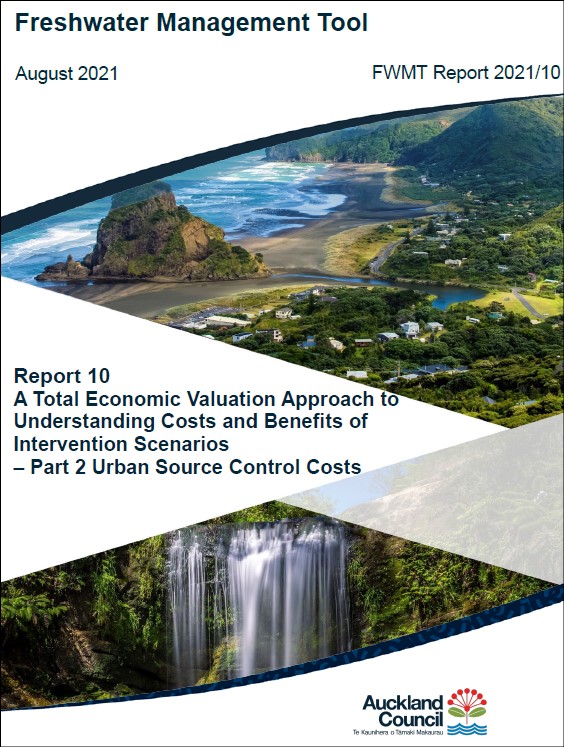Freshwater management tool: report 10. Total economic valuation part 2 urban source control costs
Author:
Auckland Council Healthy Waters Department, Koru Environmental Consultants Limited, Sue IraSource:
Auckland Council Healthy Waters DepartmentPublication date:
2021Topics:
EnvironmentFreshwater management tool: report 10. A total economic valuation approach to understanding costs and benefits of intervention scenarios – part 2 urban source control costs
Extract from the Executive summary
Auckland Council’s Healthy Waters Department is developing a Freshwater Management Tool (FWMT) to assist with decision-making around the development of freshwater management outcomes required by the National Policy Statement for Freshwater Management (NPS-FM) (e.g., both regulatory and operational programmes). A key part of this assessment is understanding the costs and benefits of implementing different intervention scenarios for future planning and decisionmaking.
Whilst source control has long been recognised as a cost effective approach for managing effects of stormwater discharges (Andoh and Declerk, 1998), research into the cost of implementing source control interventions as alternatives to structural devices is limited. In general, they are assumed to be more efficient than structural devices (especially for reducing effects of stormwater discharges in existing urban or brownfield areas), whilst having the added benefit of reducing the design capacity of downstream structural devices.
The purpose of this report is to document the cost data sources, assumptions and process undertaken to generate indicative life cycle cost (LCC) estimates for urban stormwater source control interventions for use within the FWMT, namely:
- street sweeping;
- catchpit cleaning;
- mitigation of roofing surfaces;
- good septic tank systems;
- countryside living/ urban riparian margins;
- wastewater overflow reduction;
- use of copper-free brake pads;
- use of low zinc or zinc free tyres; and
- behaviour change targeted at the general public to achieve good environmental outcomes.
The report is an extension of Ira et al. (2020) and provides details on available literature, assumptions, unit costs and LCCs for various urban source control interventions. Information about the LCC model, how the cost results should be interpreted and how they should be considered alongside our understanding of indirect costs and benefits can be found in Ira et al. (2020). ...
FWMT report 2021/10
Auckland Council, September 2022
*****
List of Freshwater Management Tool reports
2. Baseline configuration and performance | Report 2, appendices (in preparation)
3. Baseline state assessment (rivers) | Report 3, appendices (in preparation)
4. Current state assessment (lakes). Not published. Inquiries to: fwmt@aucklandcouncil.govt.nz
5. Review of the freshwater management tool. Baseline state assessment (rivers)
6. Literature review of primary sector responses to water quality: efficacy and cost
7. Riparian area management scenarios. Freshwater management tool
8. Lifecycle costs and benefits for rural mitigations in the freshwater management tool
11. Recommendations for improving rural mitigation modelling in the freshwater management tool
*****
Inquiries to: fwmt@aucklandcouncil.govt.nz
